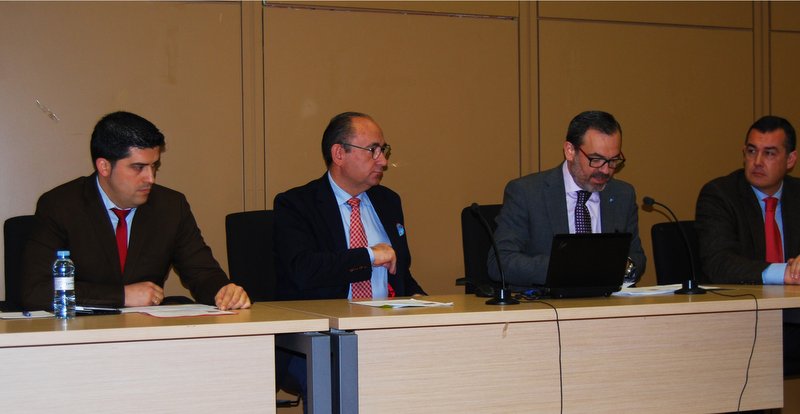On Thursday 16 February 2017, the technical conference ENOMAQ 2017 took place at the Feria de Zaragoza exhibition centre (Spain). This conference was coordinated by La Semana Vitivinícola, and its main theme was wine and sustainability. The OIV attended the event, represented by its Vice-President Vicente Sotés, with the involvement of the head of the Viticulture Unit, Mario de la Fuente.

The conference, chaired by Feria de Zaragoza director Rogelio Cuairán and La Semana Vitivinícola director Salvador Manjón, benefited from the involvement of researchers from a variety of universities and research centres, as well as the Federación Española del Vino (Spanish Wine Federation) which was represented by its Deputy Secretary General, Susana García. Technicians, producers, wineries and wine industry professionals, students and others also participated in the event, which gathered around 150 participants.
The presentations were organised into three thematic groups: Viticulture, Oenology and Wine Marketing.
A total of seven talks were given, dealing with integrated and sustainable vineyard management, the use of new varieties resistant to fungal diseases (including a case study from a winery), key elements and new technologies for sustainability in wineries, the price of sustainable wines and certifications for different types of wine.
These talks contributed substantially to the technological transfer of these advancements to the vitivinicultural sector and, in particular, to the understanding of the concept of sustainability and its potential practical application within vitivinicultural enterprises.
Sustainable vitiviniculture is a priority for the OIV, as evidenced by the promotion of sustainable viticulture within one of its five strategic axes for the 2015-2019 Strategic Plan. Understanding ‘sustainability’ to include everything surrounding it, since 1997 the OIV has been working on a variety of resolutions: in integrated production (VITI 1/1999; CST 2004); in the conservation of diversity (VITI 01/2002); in organic production (ECO 460/2012) and, of course, in sustainable production, with the resolution on the development of sustainable vitiviniculture (CST 2004); the guidelines for sustainable vitiviniculture (CST 2008) and the specific guidelines for sustainable viticulture adapted to table grapes and raisins (VITI 422/2011).
When dealing with sustainability in the wine sector, it is essential to bear in mind that it must be carried out on the basis of four fundamental pillars: environmental, social (safety and food hygiene), cultural and economic. Recently, at its General Assembly in Bento Gonçalves (Brazil, November 2016), the OIV adopted the “OIV General Principles of Sustainable Vitiviniculture - Environmental - Social - Economic and Cultural Aspects”, in the form of its resolution CST 518/2016, which allows us to distinguish between the general principles of sustainability and the production methods that fully or partially incorporate these principles.
Sustainable initiatives require planning, monitoring and assessment of knowledge. It is a constantly-evolving process and, as such, it requires continuous evaluation and improvement.
This is why in 2015, as part of its work plan, the OIV decided to restructure its working groups, creating the multi-disciplinary horizontal group “Sustainable Development and Climate Change (ENVIRO)”.
As a result, various sustainability-related initiatives are now underway as part of the work of this Expert Group, such as:
- CSR: corporate social responsibility (ISO 26000), adaptation to vitiviniculture (draft resolution CST 13-530),
- protocols and recommendations on GHG calculation,
- recommendations for sustainable water management (draft resolution VITI-TECVIT 16-569) and on the methodology to be applied when calculating water footprints,
- good practices or reasonable pesticide use in viticulture (draft resolution VITI-PROTEC 16-592),
- functional biodiversity,
- conservation of varieties and selection processes (draft resolution VITI 14-564),
- management of by-products in viticulture,
- resilience and climate change: strategies for adapting the vitivinicultural sector to climate change.
All of these topics were covered to a greater or lesser extent during the talks and, although many questions and challenges remain going forward, the OIV hopes to play a leading role and to be able to continue working together towards more sustainable vitiviniculture.
